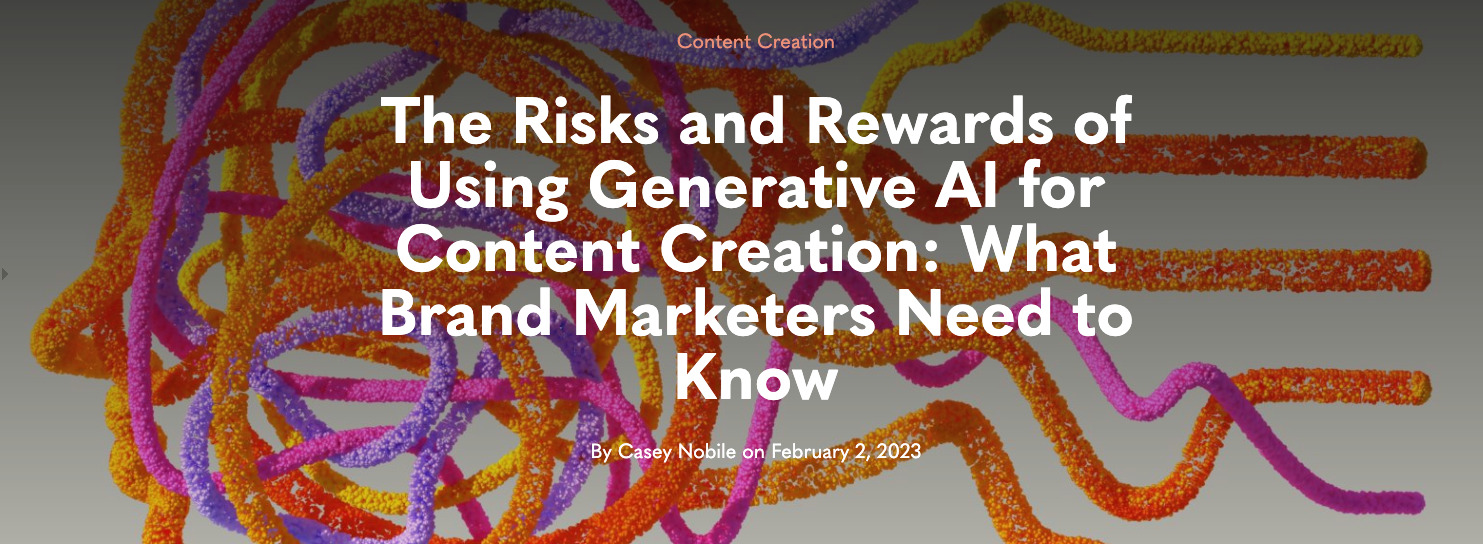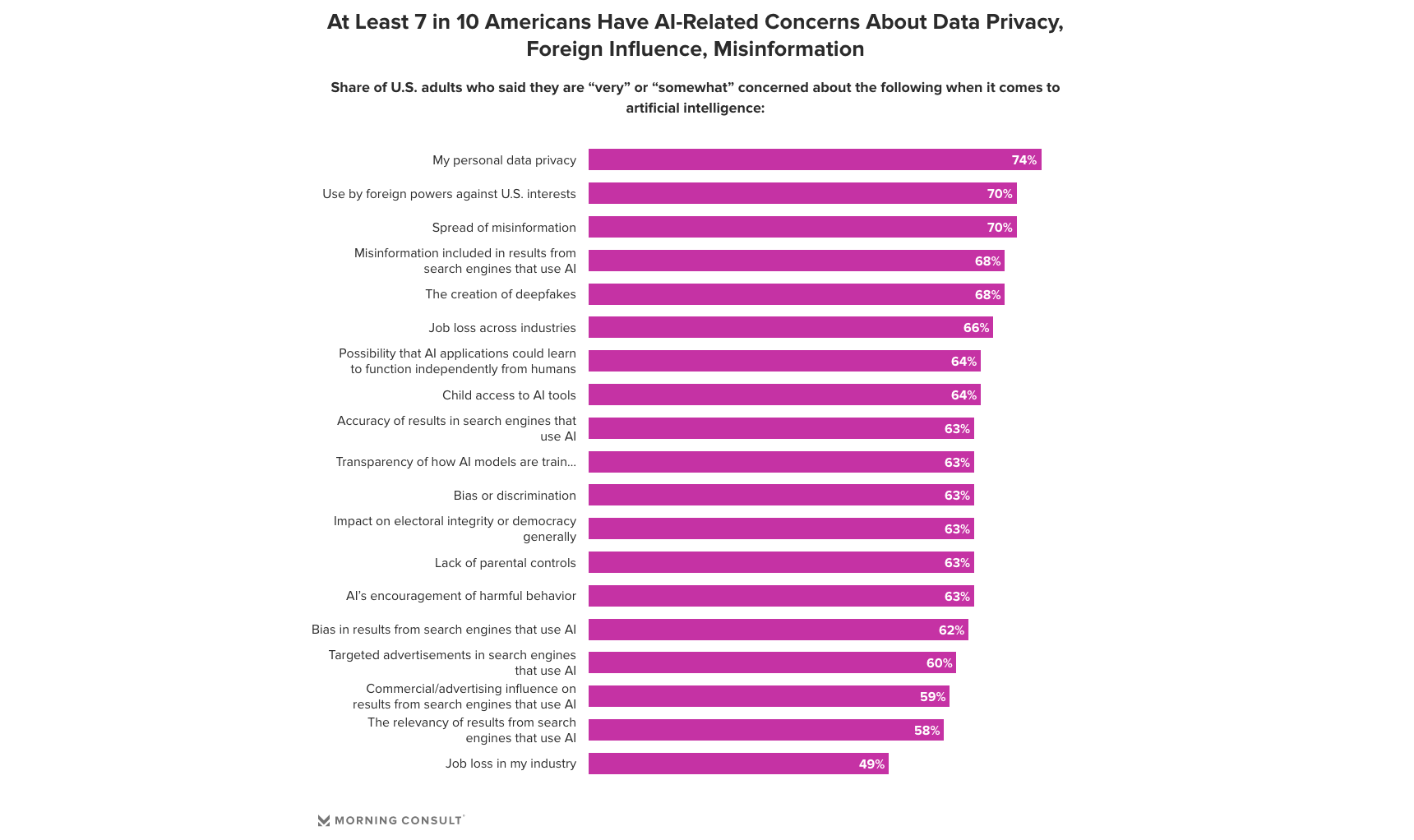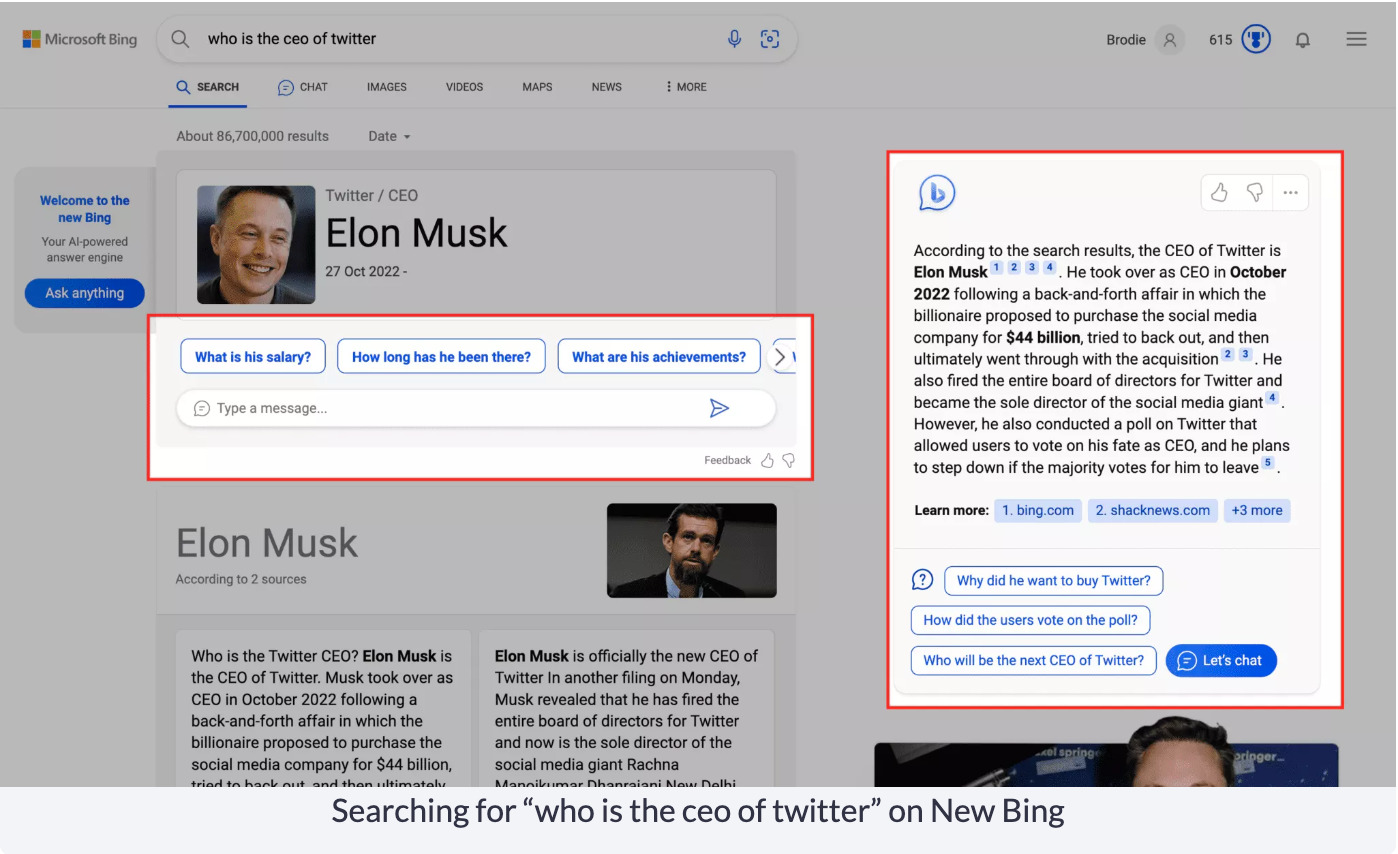Content Creation
Generative AI-Powered Search Engines: What Brand Marketers Need to Know
By Erik Mathes on March 7, 2023
Search engines are one of the rare online tools that appeal to virtually all demographics, and they're firmly cemented into our digitally connected culture. Over the past 25 years, we've gone from unleashing their vast potential to a time when we take for granted that all things are now "Google-able" and "Bing-able," giving Alphabet and Microsoft direct, disproportionate power and influence over online behavior, content consumption, and culture.
So, you better believe that the advent of generative AI-powered search engines has materialized a hype train of unprecedented proportions. Simply put, with these new AI models in the mix, these ain't your granny's Google and your baba's Bing. Imagine a "Super Google" that leverages even more sophisticated algorithms than it already does, along with large language models (LLMs) like GPT-3 and others, to generate highly personalized and hyper-specific results, and you can see why generative AI-powered search engines are on the cusp of revolutionizing how users discover, disseminate, and access information and content online.
As an SEO content strategist, consultant, and copywriter, I wanted to find out what this means for brand marketers and content creation. If you're reading this, you've likely dabbled with ChatGPT and already understand what generative AI is capable of (if not, read up on the risks and rewards of generative AI in content creation first), and now you're wondering what its presence means for the future of search.
You may be pondering how generative AI will change the way search engines understand queries and how content appears in search results. Will every query be answered directly by a search engine's AI in "position zero," with additional organic content results recommended as supporting materials? Not to mention paid search ads. Will search engine marketing (SEM) and pay-per-click (PPC) advertising competition become fiercer, with advertisers willing to throw down lofty premiums to appear above, or even within, AI-generated answers? And instead of bidding on keywords, will there be a shift to bidding on exact queries or AI prompts?
This article aims to explore the budding (and undeniably strong) relationship between the power couple of generative AI and search engines while providing insight on how to navigate the conundrums their unity brings, along with the implications of AI's influence on search engine results pages (SERPs). That way, brand marketers, SEO practitioners, and content creators can be as prepared as possible for adapting their content strategies to ensure they keep gaining ground as generative AI becomes interwoven into search engine functionality.
First, let's do a quick primer on generative AI applications and dig into what the major players are up to, with Microsoft announcing a new Ai-powered chat feature rolling out soon for Bing, Google's Language Model for Dialogue Applications (a.k.a. LaMDA) and Bard making headlines, and other AI models emerging that are focused on creating images and music, to give you the lay of this emerging digital landscape and explain how this disruptive technology will affect search results moving forward.
What is Generative AI and what are its applications?
Generative AI has gotten the media abuzz across all spheres—and everybody's got something to say.
From academics at Harvard Business Review and MIT Technology Review putting in their skeptical two cents about generative AI's near-term impact on search engines to finance folks predicting generative AI's near-term impact on stock prices, it seems like every corner of the internet is ablaze with ideas, opinions, and even downright warnings about AI's potential applications and implications.
A Morning Consult survey of 2,200+ U.S. adults on concerns around AI-powered search engines conducted between February 17 and 19, 2023, found that more than two-thirds are "somewhat" to "very" concerned about AI when it comes to their personal data privacy, foreign powers using it against national interests, the spread of misinformation, including within AI-generated search results, and the creations of deepfakes—and that's just the beginning.
People were also rightfully concerned with these tools leading to bias and discrimination in SERPs, lack of transparency behind how AI models are trained and developed, and job losses across a number of industries. And that's all before Wired called out generative AI's "dirty secret" of increased carbon emissions from the higher computing power these search engines-on-steroids require.
Got all that? Okay, so: WTF is it?
Generative AI is a type of artificial intelligence that uses machine learning to create new content from data it has been fed, using high levels of variety and unpredictability with only a few basic building blocks. This technology is getting more popular with search engines as they try to improve their algorithms and deliver more accurate search results, especially since ChatGPT broke the internet.
The technology works by taking existing data points such as text or images and using them to generate entirely new pieces of content. For example, OpenAI's DALL·E and the new-and-improved DALL·E 2 (which generates images with more accuracy and four times greater resolution) can render realistic images and art based on text prompts, including completely unrelated ideas. If you ever wanted to see an avocado as an armchair in dozens of iterations, DALL·E has got you covered.
Similarly, text-based generative AI can take snippets of words or phrases from one source document and combine them into entirely new sentences, paragraphs, and even entire articles with minimal human input. Think ChatGPT and other AI content writing tools that can answer queries in a chat format and tap into natural language processing (NLP) to produce short– and long-form content for blogs, websites, social media, and other marketing channels in a fraction of the time it takes the average writer with no help.
The potential applications for this technology are vast—from providing more relevant search results on major platforms like Google and Bing to generating personalized news articles based on user interests or preferences. Generative AI could even be used in marketing campaigns to create custom ads tailored specifically for each user's needs or wants without requiring manual input from marketers themselves. The possibilities are endless (and exciting) when it comes to what generative AI could do for search engines if properly implemented into their algorithms.
Music creation is yet another generative AI application that is set to make waves (sound waves, at least). By training AI models on musical patterns and sounds, they are able to generate their own novel compositions. Similarly, generative AI models have been developed for other creative arts like poetry and stories, which are capable of producing entire pieces of work by themselves with minimal human input, with results showing that we'll still need creative humans for a while.
How are search engines using generative AI?
Microsoft Bing
Microsoft has invested heavily in OpenAI, the company that develops ChatGPT and DALL-E technologies so that it can incorporate proven generative AI technology into Bing. In fact, the company already announced that Bing will be rolling out a cutting-edge AI search engine that will feature a "new, next-generation OpenAI large language model (LLM) that is more powerful than ChatGPT and customized specifically for search." According to the company, it is "even faster, more accurate and more capable" than ChatGPT and GPT 3.5, with the major difference that it has near real-time access to the internet, giving it up-to-date info, unlike OpenAI's free ChatGPT version.
While this major update has yet to be released to the public, you can join the waitlist for the new Bing so that you can access its powerful new search features among the first group to try it. Those who have beta tested the new Bing show that AI-generated results appear next to what would be referred to as Featured Snippets and Knowledge Panel results on Google, splitting the SERP into two columns with the left side showing traditional results and the right side. It also can split off into a standalone Chat page similar to ChatGPT that's tapped into the web for responses with near-real-time data feeds.
Microsoft is hoping to steal some of Google's near-93% market share of the search engine space worldwide compared to Bing's fractional 3% by getting into generative AI search first, and we'll have to wait and see how much of a jump they'll be able to get.
Google Search
Google engineers and execs aren't just futzing around with ChatGPT as this nascent space evolves, they've also invested heavily in building generative AI models, including LaMDA, released in 2021 as an answer to OpenAI's GPT-3. Built on Transformer, the same neural network used by GPT-3 for language modeling, LaMDA brings conversational chat into the mix for their own AI initiatives.
According to Google, LaMDA was trained in dialogue and should be able to compete with OpenAI's ChatGPT in the near future. Still, Google is hesitant to release any generative AI tools to the public until they can ensure safety and risk mitigation in accordance with their AI principles, so you can only read up on LaMDA for now.
Building upon LaMDA, this year Google announced a new LaMDA-powered conversational chat service called Bard as an answer to OpenAI's ChatGPT. According to Google and Alphabet CEO, Sundar Pichai, "Bard seeks to combine the breadth of the world's knowledge with the power, intelligence, and creativity of our large language models. It draws on information from the web to provide fresh, high-quality responses [and] can be an outlet for creativity and a launchpad for curiosity."
Unfortunately, the company seems to have missed fact-checking in its initial advertisement for Bard, causing its parent company, Alphabet, to lose $100M in market capitalization in a single trading day due to an 8% drop in share price. Still, some people believe that the Bard fiasco could ultimately be a net positive because it will cause Google to double down on its technology to avoid similar blunders in the future when they do release Bard to the public.
Meanwhile, Google is developing additional generative AI models in language and other areas, including PaLM, Imagen, and MusicLM, to enhance its own capabilities and offerings and make generative AI more mainstream. Here are some more details about these groundbreaking initiatives.
More generative AI models from Google
PaLM
PaLM (Pathways Language Model) is another AI language model created by Google that is built upon the company's Pathways model using 540 billion parameters to perform natural language processing (NLP) tasks to understand the context of words within sentences or phrases. PaLM can be used for tasks such as question answering, summarization, translation, and more, and it has been trained in logic, mathematics, pattern recognition, and other complex tasks.
Not only can PaLM generate strong code with only 5% of its pre-training dataset having code, but it "can distinguish cause and effect, understand conceptual combinations in appropriate contexts, and even guess the movie from an emoji," according to Google.
Imagen
Imagen is an AI text-to-image generator created by Google Research that was released as a research paper not long after OpenAI released DALL·E 2 in 2022. While both Imagen and DALL·E 2 are generative AI models that create images from text prompts, the main differences are that DALL·E and DALL·E 2 are available for use right now, while Imagen is currently unavailable for use because, according to Google, "there is a risk that Imagen has encoded harmful stereotypes and representations, which guides our decision to not release Imagen for public use without further safeguards in place."
The other important factor to note is that in human evaluations, Imagen outperformed other, similar methods, including DALL·E 2, in alignment and fidelity, so while no one can actually use it, you can know that it will likely be better than DALL·E 2 (pending any advancements by OpenAI) when it is eventually released.
MusicLM
MusicLM is a generative AI language model developed by Google Research that is capable of generating musical compositions. It uses a technique called "conditional generation," which allows it to generate music based on specific parameters, such as genre, style, and mood. According to Google, "MusicLM can be conditioned on both text and a melody in that it can transform whistled and hummed melodies according to the style described in a text caption"
On the Abstract page linked above, you can hear MusicLM in action as it generates clips between ten seconds and five minutes from different prompt types, including a 30-second audio files generated from "A fusion of reggaeton and electronic dance music, with a spacey, otherworldly sound. Induces the experience of being lost in space, and the music would be designed to evoke a sense of wonder and awe, while being danceable," samples generated from famous painting titles, authors, and descriptions (including Van Gogh's Starry Night and Klimt's The Kiss), and ten-second snippets of random accordion sounds generated to match different genres, such as rap, EDM, and death metal. While the quality can be grainy in some instances, the output is still something to marvel at, and I highly recommend giving some of MusicLM's sample tracks a listen.
Generative AI's likely implications on search results
More accurate and relevant SERPs
It feels safe to assume that Generative AI is going to have a major impact on how people use these search engines in the future. This technology can help provide more accurate results faster than ever before, while potentially increasing relevance and accuracy across multiple languages and contexts.
Google and Bing are each leveraging generative AI beyond chat to optimize their search results, introducing higher perplexity and increased randomness with minimal tokens to their algorithms. So, what exactly does that mean for search results? In a nutshell: higher accuracy and relevance in the SERPs.
In the context of AI and natural language processing, perplexity is a measurement of how well a language model can predict or understand a sequence of words. Specifically, it is a metric measuring of the model's uncertainty or unpredictability in predicting the next word in a sequence. A lower perplexity score indicates that the model is better at predicting the next word, whereas a higher perplexity score suggests that the model is more unsure or unpredictable. It may seem counterintuitive, but higher perplexity scores can be desirable, as they indicate that a model is producing more diverse and unique outputs. This can be useful in SERPs, where search engines are looking to provide users with a diverse set of relevant results.
Tokens, in the context of AI and NLP, are the basic building blocks of language. Usually individual words, tokens can also be other linguistic units such as subwords or characters. The generative AI models that use tokens can combine them in different ways to produce novel outputs that are similar to, but different from, the data that the model was trained on.
By leveraging generative AI with minimal tokens, search engines like Google and Bing can introduce higher perplexity to include a wider variety of potential matches, including more niche and highly specific content. On top of that, generative AI can increase randomness, which helps to avoid the problem of presenting users with the same set of results for similar queries. This means that a search engine's results will have a higher degree of diversity and will be more likely to satisfy the different needs and interests of their users.
Personalized results + AI-generated answers to find what you need faster
Generative AI could also affect search engines by providing direct answers to user queries without requiring them to click through multiple pages of results. We already know that the new Bing will feature a split screen on their SERPs, with traditional paid and organic results, along with their own version of featured snippets, on the left side, with an AI-generated answer box on the right side, complete with clickable prompts to answer related queries and start a new AI chat. (We'll have to wait and see how Google evolves.) Having what will amount to two "position zeros" with more relevant information immediately displayed will likely help people find information faster than ever before, keeping people from scrolling too deep down the SERPs.
Generative AI is also likely to lead to a more personalized search experience, with user preferences and past behavior patterns taken into account when generating relevant content recommendations related directly back to individual queries. This means that people who use certain terms repeatedly or regularly visit certain websites should see tailored suggestions whenever they perform searches using similar language or topics, leading them towards more accurate outcomes faster while also reducing the chances of wasting time due to overly broad keyword targeting strategies employed before these advancements took hold.
Paid search advertising expands to AI-generated content
Another way in which generative AI might change search engine usage is by altering paid advertising models within SERPs (search engine result pages). Currently, advertisers pay for keywords so that their ads appear when those words are used in searches; however, with more advanced forms of generative AI, this model may transform or become obsolete as exact query matches become increasingly important.
Advertisers may be inclined (or required) to bid on specific phrases or AI prompts rather than just generic keywords, making competition much stiffer than before. Or, perhaps advertisers will be given the opportunity to place ads directly within the generated answers provided by the algorithm itself.
Overall, it is evident that generative AI has significant implications for both consumers and businesses when it comes to how we use search engines now and in the future. It offers us greater convenience, increased accuracy, and improved personalization capabilities across all platforms involved.
While there are no definitive answers as of press time on how paid search will be affected, we can safely assume that Microsoft and Alphabet will adapt their revenue-generation models to include ads in AI-generated search results, since more than 80% of Google's 2022 revenue came from advertising and Microsoft generated nearly $12B in ad revenue in 2022, and they won't want to see their numbers drop. Query bidding is as likely to change as competition levels are likely to rise once AI-generated search results become the norm.
How content marketers should adapt to generative AI search engines
Just as we can't say for certain what paid search practitioners will face on an internet powered by generative AI search engines, we can only speculate as to exactly what content marketers will have to change in their processes to ensure their content is seen. Still, we have some suggestions for publishers, producers, and creatives to consider when trying to rank, compete for search visibility, perform keyword research, and optimize their content for the future of search.
Aim for producing the highest-quality E-E-A-T content
No, Google isn't telling you to fill your face with food. E-E-A-T stands for Experience, Expertise, Authoritativeness, and Trust, and according to Google, these are vital factors to establish in any content you create and publish, with Trust being the most important factor of the four. Even with the advent of generative AI search engines, you should always aim to produce trustworthy content that informs readers with facts that are properly sourced, along with helpful and safe recommendations for anything you promote on your site.
Write more conversationally and produce more multi-format content
Generative AI reads queries using natural language processing (NLP) algorithms, which are designed to understand the meaning and context of language and to interpret it in the same way that a human would. With that in mind, the use of generative AI in search engines is likely to impact the keywords and phrases that content marketers optimize for, as these algorithms have the potential to generate more accurate and relevant search results based on the user's intent.
Optimizing content for specific keywords or phrases may become less important as search engines become more sophisticated and able to understand the context and meaning of natural language queries. Instead, content marketers will need to focus on creating high-quality, relevant, and engaging content that answers the user's questions or provides valuable information in a way that is easy for both humans and AI algorithms to understand. This may involve using more natural language and long-tail keywords in content, as well as incorporating multimedia content like images and videos to provide a more comprehensive and engaging experience.
Google owns YouTube, so it makes sense to create video content to complement your SEO blog articles and landing pages and help boost your positions in the SERP rankings. That isn't likely to change soon, so consider implementing a strategic video plan into your overall content strategy to maximize exposure and favoritism with Google algorithms specifically, while providing better UX.
Keep a watchful eye on the paid search landscape
No one can be sure what the costs of doing business with generative AI search engines will be from a paid advertising perspective as of yet, so it's best to tread carefully before investing heavily in this space. See what the CPCs are for your target keywords and AI prompts once Google introduces a similar feature to what the new Bing is expected to look like before gauging if PPC ad spend is worth it for your business. Some companies used to this style of marketing may be priced out and will have to find new ways of getting online exposure.
Consider how "optimization" will evolve
On top of optimizing content for E-E-A-T, multimedia, and NLP by including conversational keywords, long-tail keywords, and semantically related keyphrases, content marketers will have to consider new factors that will be part of the SEO workflow when generative AI becomes the backbone of search.
It is likely that personalization will play a large part in the future of search, so understanding your target audience and creating tailor-made content for them will be more vital than ever when it comes to ranking. As Seth Godin would say, understanding "who is it for?" is key to creating something that truly resonates, and it is likely that this kind of content will resonate will humans and search engines alike more than ever before.
Another educated guess is that user-engagement metrics like bounce rate, time spent on a page, and clickthrough rate will begin to hold even more weight in search engine algorithms as the companies test out new methods of displaying SERPs with AI-generated answers and high perplexity that leads to more diverse results being featured.
Generative AI search engines: prepare for change
Generative AI will undoubtedly have a profound impact on the way search engines, SEOs, and SERPs operate—with both organic and paid results feeling the effects—in an effort to provide more accurate and reliable results.
While we can't say for certain what the changes in SEO will be as generative AI search engines become the new normal, content marketers should be ready to update their content strategies and learn new research methods that may involve finding the best long-tail keywords, conversational keyphrases, and AI prompts to optimize their content for in hopes of ranking high on Google, Bing, and beyond.
Looking for more content on the future of marketing? Consider subscribing to our newsletter to get articles from our ongoing series on generative AI delivered right to your inbox. You can also book a meeting with our team to see how generative AI is powering content creation at Skyword by boosting efficiency without compromising quality or brand integrity for our clients.




